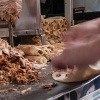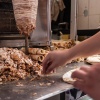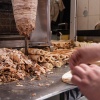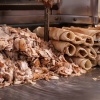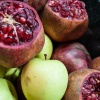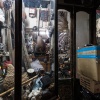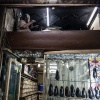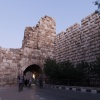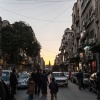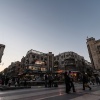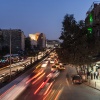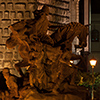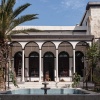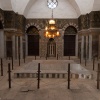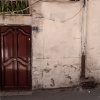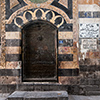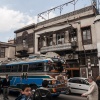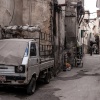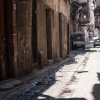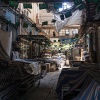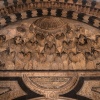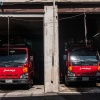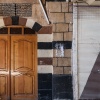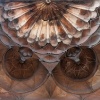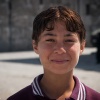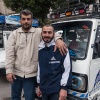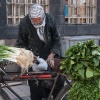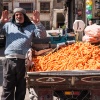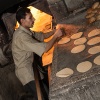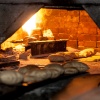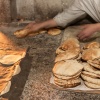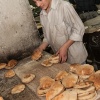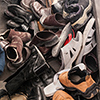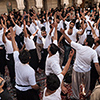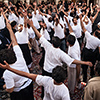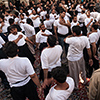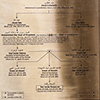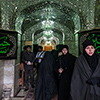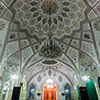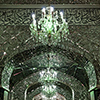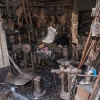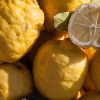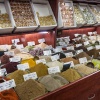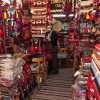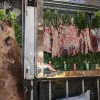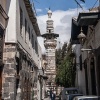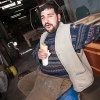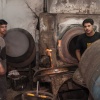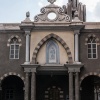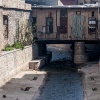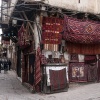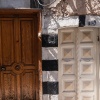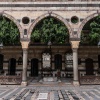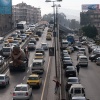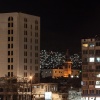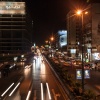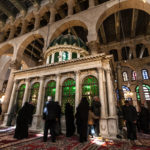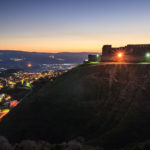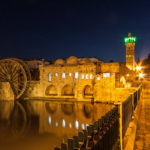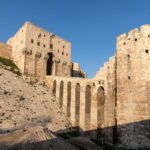More eternal than Rome – Damascus
In the Thick of Things
In contrast to us Germans people from Damascus don’t eat much during the day. Well, being in the thick of Damascus’ tiny souk lanes I was starving to pieces but God (hallelujah!) sent me a Shawarma stall and brought the Shawarma guy the business of his life as I gorged everything coming across. Changing his mien from hospitality to pure astonishment he said “Man, you eat Shawarma like pretzel sticks!”
Well, that was no surprise as the wonderfully flavoured Shawarma from Damascus was the best I’ve eaten during my whole Arabia trip. You roll grilled marinated chicken, some tomato, gherkin and (very important) a dash of wether lard, spice it Arabian and roll it into a flatbread. Perfect for lunch, dinner and even breakfast!
Literally having a little ball belly being filled with food I wander back through old town letting myself drifting away. The mass of people took me to a quarter to the north of Umayyad Mosque, where suddenly an old man beckoned to me to come nearer. He pulls out a key and in the blink of an eye we stood inside a splendid inner courtyard with a rippling fountain in the middle and an orange tree with water spray sparkling leafs. Watching the clouds moving he brings me back to earth offering me some black tea with mint leafs. How could I say no to such a delicacy?
Again the old man pulls out a key and instantly we stand amidst the cultural assets of the Dhaheriyah library, with its countless and wonderfully calligraphy graced book backs. On the opposite side of the road yet another time the old man pulls a key and opens heavy doors. Behind the curtain is a marble outfitted room that turns out to be a tomb, the final resting place of Sultan Baibars I., who sent the Crusaders back home and who has got a similar public reputation like Saladin.
On Fridays Islamic cities can be surprisingly lifeless as then the usually life filled and bustling lanes of the Souk are empty like an alcoholic’s beer bottle. Not even the merest stall is open. Walking in the vicinity of Straight Street I notice an open garage revealing one of Damascus cutest secret, the mini trucks of the fire brigade, which are just small enough to fit the narrow lanes of old town. The day before, on a Thursday, bear the fire brigade colourful painted and tinsel-laden busses drove towards Bab Sharqi, the eastern gate of old town.
Their buzzing Diesel engines could be heard from far away already and rudely awakened the Medina from deep slumber, but what looked a bit like a military transport was absolutely innocuous as school busses brought kids living in Damas’ suburbs back home. Their noses flatten on the bus windows as they curiously watch me strolling through old town.
But let’s get back to Friday, the Muslim Sunday, where I suddenly found myself in a mass of untamed yelling people. To be honest, I was yellow as I was amidst a situation that I often saw on TV, only a burning USA flag was missing. But I was soooo wrong. Quickly it turned out that those people wanted me to come with them as they wanted to show me something. The whole situation was far away from anti-Arabic cheap propaganda aired by unobjective western TV stations. The people and their procession took me to Shiite Sayyidah Ruqayya Mosque, where entering meant to climb a mountain of shoes first.
Instantly drawing everyone’s attention an older man approaches me very politely asking if I could open my backpack. He explained himself that against the background of daily terrible suicide bomber news coming Iraq, which is not far away, they had to check everyone. That was an absolutely appropriate security check and broke the ice between the pilgrims and me. The old man took me by the hand and explained that they are mourning the death of Ruqayyah, the youngest daughter of Shiite Imam al-Husain ibn Ali, who is the chief of the martyrs and direct successor of Prophet Mohammed.
In the inner yard all men suddenly dressed themselves with a white t-shirt. Changing their clothing I could see scars from self-flagellation. Then they started singing a song while stretching their arms and finally hitting their chests heavily with open hands. That rhythmic bang was widely (!) audible, even outside and far away from the mosque. Some of the men had bloody faces as they started cutting their foreheads. Some other men “preferred” to whip themselves. Things in the inner yard became hypnotic and I went inside the prayer hall where countless women sat around the shrine crying their hearts out. The faith of those people was clearly perceptible as if you eat a good steak.
Understandably I wasn’t allowed to take photos. I switched off my camera as a symbol of having noticed that as well as the moment’s intimacy. Without knowing Arabic fluently, this little act brought me people’s respect and acceptance and the local Imam allowed me to join the prayer as well as taking photos after the prayer though. During the prayer I sat next to a legion of men crying their hearts out as well towards the shrine of Sayyidah Ruqayya. With eyes red raw from crying rivers half of the mosque approached me after the prayer, shook my hands, hugged me, small boys present me with sweets. All people were happy and proud that I was part of the moment, which is unimaginable to happen if a Muslim would join a Catholic or Protestant church service the way I did.
Although being a well- educated and informed person I have the deepest respect for religion as it actually stands for socially universal values like for example manners, social interaction or how to approach foreigners. Even despite not being a really religious person religion accepted me, a stranger, and let me experience Damascus in a way only a few western travellers are allowed to see. In the year 2014 and IS things look different and there’s no guarantee at all to become involved in such religious moments without big fear on both sides.
What Thames is for London, is Barada for Damascus and like in London the name of the main river graces many products as well as services, for example when it comes to beer. Barada is Syria’s most famous Pilsener and due to East German technology being involved back in the days it is also a really good one. Beer in a Muslim country? Yes, and it shows how open-minded Syrian society already was and I bet the flow rate of the beer is much more constant than the river’s. It is the Barada River that kept the oasis of Damascus alive and interesting for a settlement that became a millennia-old city.
Used photo equipment: Canon EOS 20D, Canon EF-S 10-22, Tamron 17-50 f2.8, Tamron 28-75 f2.8
